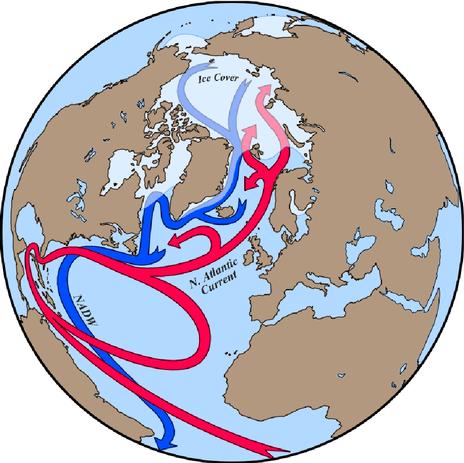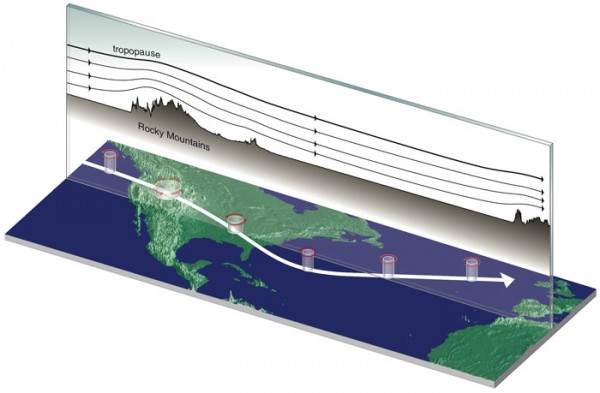![]() In science, you discover that you’re wrong at least as often as you’re proven right – and the things that you end up being wrong about can be quite surprising. Prior to last week, if asked I would have confidently confirmed that the reason the UK does not have a polar bear problem, despite being located at the same latitude as Hudson Bay, is the heat supplied by warm water transported into the northwest Atlantic from the Gulf of Mexico by the Gulf Stream. But then, courtesy of Kevin Anchukaitis, known on Twitter as thirstygecko (and someone you really should follow if you’re interested in things paleoclimatic), I found out that this is not the case at all.
In science, you discover that you’re wrong at least as often as you’re proven right – and the things that you end up being wrong about can be quite surprising. Prior to last week, if asked I would have confidently confirmed that the reason the UK does not have a polar bear problem, despite being located at the same latitude as Hudson Bay, is the heat supplied by warm water transported into the northwest Atlantic from the Gulf of Mexico by the Gulf Stream. But then, courtesy of Kevin Anchukaitis, known on Twitter as thirstygecko (and someone you really should follow if you’re interested in things paleoclimatic), I found out that this is not the case at all.
[blackbirdpie url=”http://twitter.com/thirstygecko/status/211195868248940544″]
If you follow the link,

=”” The Gulf Stream is part of the global ocean conveyor, but it doesn’t convey much extra warmth to Europe. Source: Marika Holland.
The oceans do still play an important role in keeping Europe’s winters mild, but it is nothing to do with the Gulf Stream. The winds that blow northeast onto Europe from the Atlantic carry with them air that is relatively warm even in the winter; the large heat capacity of water means that the sea cools off more slowly in the winter, and this also moderates the temperature of the air above the sea surface. This contrasts with the eastern US, where the prevailing southeast winds are cold, having lost their heat to the thousands of kilometres of land surface they’ve already passed over.
So the oceans are still involved, but it is the atmosphere that is the true key to explaining Europe’s mild winters; and in a pleasing geological twist, it is apparently the presence of the Rocky Mountains that causes the large scale waviness of atmospheric circulation that magnifies the temperature contrasts on either side of The Pond (Richard Seager explains this in more detail in this more comprehensive piece at the American Scientist).

How the Rockies cause the westerlies to wiggle, magnifying the trans-Atlantic temperature difference. Source: The American Scientist
According to Seager, the notion that the Gulf Stream was warming Europe can be traced back to a book first published in 1855, and is “the climatological equivalent of an urban legend”. It is certainly persistent enough, although given that this particular “fact” has been promulgated not by a friend’s sibling’s cousin’s friend over a pint on a Friday evening, but by scientists and educators in newspapers, televison programmes and lectures, it’s arguably even more pernicious. But how did this happen? Isn’t science meant to be self-correcting?
Here’s how it can happen. In the introduction to your average paper, you’ll often see sentences along the lines of:
The link between [phenomenon] and [process] has long been known (Bloggs, 1996).
The implication is that everyone knows and accepts this, so it’s not worth wasting time going through the evidence in painstaking detail; but if you’re interested, you can look up the given reference for the gory details. Most of the time, this is exactly what you get when you track the given reference down; but sometimes, you find that it is nothing more than the oldest reference to this fact that the original paper’s author was willing or able to look up, and all it says is:
There is strong evidence that [phenomenon] and [process] are linked (Obscuro, 1982).
If you persist further, you may find yourself going through the process of looking up a reference, only to be directed to an even earlier one, several more times before you finally reach the canonical document, the one that contains actual data and discussion. And this is what you find:
Based on [invalid data] collected using [method known to be inaccurate] and assuming [long disproven assertion], we conclude [process] causes [phenomenon].
This is how a scientific urban myth is born: by the time you reach a citation 3 times removed from the supporting observations, a conclusion becomes something ‘everyone knows’ despite very few people ever being exposed to the evidence it was based on. “I’m telling you, this paper told that paper that this other paper has compelling evidence for this! Compelling! Well no, I haven’t actually read it myself…”
I don’t believe this is a hugely common phenomenon. But science nowadays is such a vast body of knowledge that there are bound to be a few zombie ideas traipsing around in it, managing to survive because no-one has really properly examined them for a while. It is only when a scientist is inspired to chase one of these ideas back to its origin that they are brought into the light.



Comments (17)
Links (2)
-
-
Pingback: What’s up? The Friday links (35) | paleoseismicity.org
Pingback: Europe Is Warmer Than Canada Because of the Gulf Stream, Right? Not So Fast | Smart News